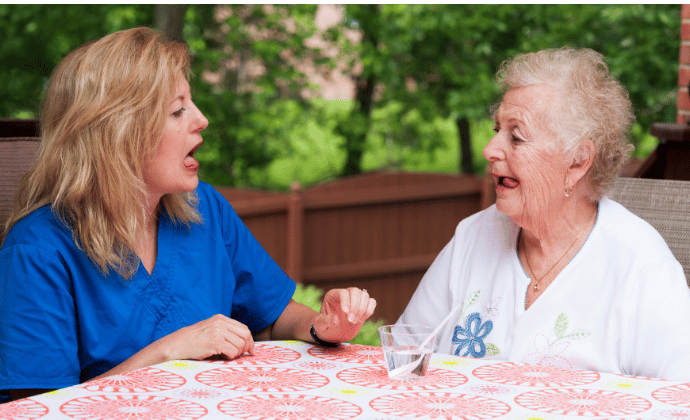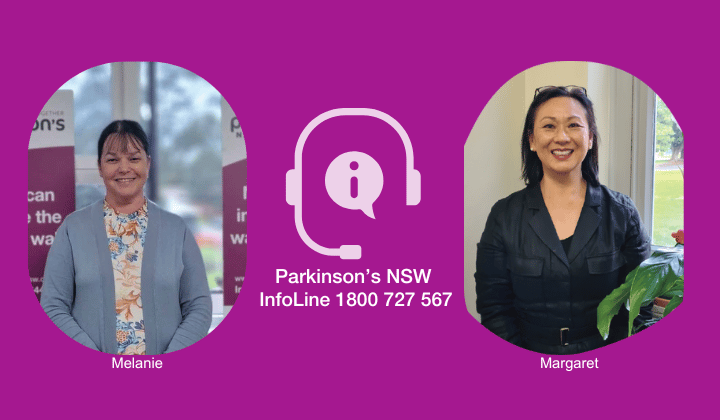Being able to communicate is an essential part of our life. We communicate to build connections with others, to speak to our loved ones, to work or volunteer and for being social. No matter what stage of Parkinson’s you may be at, of course you want to communicate and be heard and understood. That’s where your speech and language therapist can help.
It is estimated that speech problems may affect around 90% of people with Parkinson’s. Difficulties may arise at any time, the main ones being:
- Weak voice or reduced voice volume, resulting in the need to repeat oneself
- Hoarse voice and limited intonation resulting in a monotonous voice
- Slurred or unsteady speech
- Speaking too fast or too slow
- Difficulty speaking clearly whilst doing other things as speech may require more concentration than before
- Stuttering or difficulties getting started
- Forgetting what you were trying to say or losing your train of thought in a conversation
- Difficulty following conversation when in a group.
Speech therapists can help with offering support and strategies for easier communication as well as rehabilitation and maintenance therapy.
Here are six ways speech therapy can help people with Parkinson’s:
1. Early intervention
Speak to your doctor before you start to exhibit changes to your communication, as holding on to the skills you have is essential to prolong the progression of symptoms as time goes on.
However if you or your loved one are already experiencing symptoms and are concerned then it is also a good time to seek help for your speech or communication. Your doctor can refer you to a speech therapist or you can also refer yourself.
Speech Therapists can work with you to rehabilitate or maintain your skills, as well as put strategies in place to enhance your communication before Parkinson’s has any significant impact. Early intervention may even be able to prevent or delay other problems, so seek advice as soon as you can.
2. Volume control
A quieter, softer voice – or hypophonia – is common in people with Parkinson’s. In fact, you may not even realise you’re speaking more softly than before. Your speech and language therapist will focus on helping you maintain the correct volume level in your speaking voice. This can be done through calibration tasks and working with effort-based therapies aimed at achieving a louder voice more easily.
If the person’s voice is very low and rehabilitation is not enough, then another option is to use amplification to be heard when you need to.
3. Communication strategies
There are many other things to consider for effective communication, like for example non-verbal factors such as facial expressions, body language etc. Speech therapy can help to make the person more aware of these skills and learn to use them with more intent to make their communication more effective.
Alternative means of communication can also be considered. These include communication books and technical aids such as tablets and phone apps.
4. Therapy programs
Your speech and language therapist may suggest a treatment program specifically designed for voice and speech in people with Parkinson’s.
Both Lee Silverman Voice Treatment (LSVT) and SPEAK OUT! are speech therapy programs designed to address speech and voice impairments in individuals with Parkinson’s disease.
- Lee Silverman Voice Treatment(LSVT): LSVT is an intensive program comprising 16 sessions over four weeks, focusing on improving vocal loudness and speech clarity. Delivered by certified speech-language pathologists, LSVT has demonstrated significant improvements in voice and speech functions for individuals with Parkinson’s disease.
- SPEAK OUT!: Developed by the Parkinson Voice Project, SPEAK OUT! is a structured therapy program that emphasises speaking with intent to enhance speech. The program typically includes 12 individual sessions, combining education, personalised therapy, and daily home practice to help patients transition speech from an automatic function to an intentional act.
Both programs aim to empower individuals with Parkinson’s to regain and retain effective communication skills, thereby improving their quality of life.
5. Group therapy
Group work can be a very effective way of practising and reinforcing techniques learned in your individual therapy sessions. Not to mention it is a great opportunity to meet new people with similar symptoms and enjoy a social life.
Your local speech therapy services may be able to offer such groups, but one can also access online groups around the world.
6. Lifestyle changes
Another way speech therapy can help with Parkinson’s is by addressing your lifestyle and environment to promote and enhance better communication. Simple changes can make a difference to your day-to-day life.
Things like considering how noisy your environment is, reducing any distractions, and facing the person you’re talking to can all help with effective communication.
Source:
Original article by Sarah Dawson and Veronica Clark
Parkinson’s NSW can help
Need to know more or connect with a speech therapist in your area? Contact us.
-
Parkinson’s NSW InfoLine : 1800 727 567






